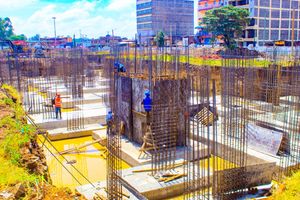
A model of Starehe Point affordable housing project by Gulf Cap Real Estate.
The government intends to spend Sh2.8 billion on research and feasibility studies towards the delivery of the affordable housing project in the next financial year, 2025/26 financial year.
This is notwithstanding that government documents show that there is little interest from Kenyans registering for the acquisition of the affordable housing units.
Auditor-General Nancy Gathungu has cast doubts over the credibility of the project, given the lack of ownership documents for parcels of land where the affordable houses are being erected.
The allocation contained in the Sh119.6 billion budget estimates for the State Department for Housing and Urban Development for the 2025/26 tabled in the National Assembly, is a Sh1 billion increase from what was allocated in the current financial year, 2024/25.
The State Department’s allocation, which includes Sh2.9 billion recurrent and Sh116.7 billion development, comes as questions have emerged on the steep rise of the government agency’s budget.
“It is not normal how the State Department’s budget has steadily increased, given the pressing needs in critical expenditures like disbursement of capitation amounts to public learning institutions, provision of affordable healthcare, enhancement of security in the country,” said Kitutu Chache South MP Anthony Kibagendi.
The affordable housing units programme is financed by the 1.5 percent deductions from salaried Kenyans as matched by an equal amount from their employers, with at least Sh5 billion realized on a monthly basis.
The project includes houses for military, police, and correctional services personnel, student accommodation, and private-sector developments.
The audit reports show that as of December 2024, the government had collected Sh88.7 billion from the Housing Levy, part of which was used to support the construction of the houses, and Sh46 billion invested in Treasury bonds.
Mr Kibagendi’s concerns are anchored on the fact that in the 2021/22 financial year, Sh15.5 billion was allocated for the housing project, in the 2022/23 period, Sh11.8 billion, in the 2023/24 fiscal year, Sh78.2 billion, and in the 2024/25 year, Sh74.7 billion.
Despite the allocation, the actual expenditures for the period 2021/22 to 2023/24 financial years were Sh11.4 billion, Sh10.3 billion, and Sh25.5 billion, respectively.
The State Department’s budget is, however, projected at Sh89.32 billion for the 2026/27 financial year and Sh76.95 billion in the 2027/28 period.
Although the State Department’s budget indicates that the government will register about 598,800 homeowners on the online platform- Bomayangu- in the next financial year, the projections in the 2025 Budget Policy Statement (BPS) show a worrying trend.
The BPS shows that in Bomayangu, over 547,000 people have registered, out of which only 52,000 have cumulatively saved more than Sh2.3 billion towards the Bomayangu homeownership.
While President William Ruto gave an undertaking to construct 250,000 affordable housing units every year of his tenure, the BPS shows that in his two years in office, 124,000 housing units are at different stages of completion across 75 sites in 37 counties.
Ms Gathungu revealed that the State Department for Housing does not have ownership documents for land where the affordable housing projects are being implemented.
“In the circumstances, it could not be confirmed how the sectional titles would be processed without the original land ownership documents, and this could hinder the Affordable Houses sale to the public," says Ms Gathungu.
The estimates show that major achievements under the housing project during the review period include the construction of 605 affordable housing units in Bondeni, Nakuru, and the development of 462 units for the National Police and Kenya Prison Services.
It also includes the facilitation of mortgage access for 692 civil servants, the refurbishment of 1,633 government pool-housing units, the successful installation of 49 high mast floodlights across various counties, and the completion of 10 market constructions.
Others are the establishment of 13 Constituency Appropriate Building Materials and Technology (ABMT) centers and the training of 4,110 new trainees in the application of ABMTs.
In the next financial year, the government intends to construct 215,221 affordable housing units, 80,909 social housing units, and 94,368 beds in student hostels.
Furthermore, an additional 8,000 hostel units will be developed, alongside 23,672 housing units designated for the Police and Prisons Services and 10,033 housing units allocated for the Kenya Defence Forces.
Mortgage loans will be extended to 650 Civil servants, and 33 training centers will be established for the ABMT initiative.






